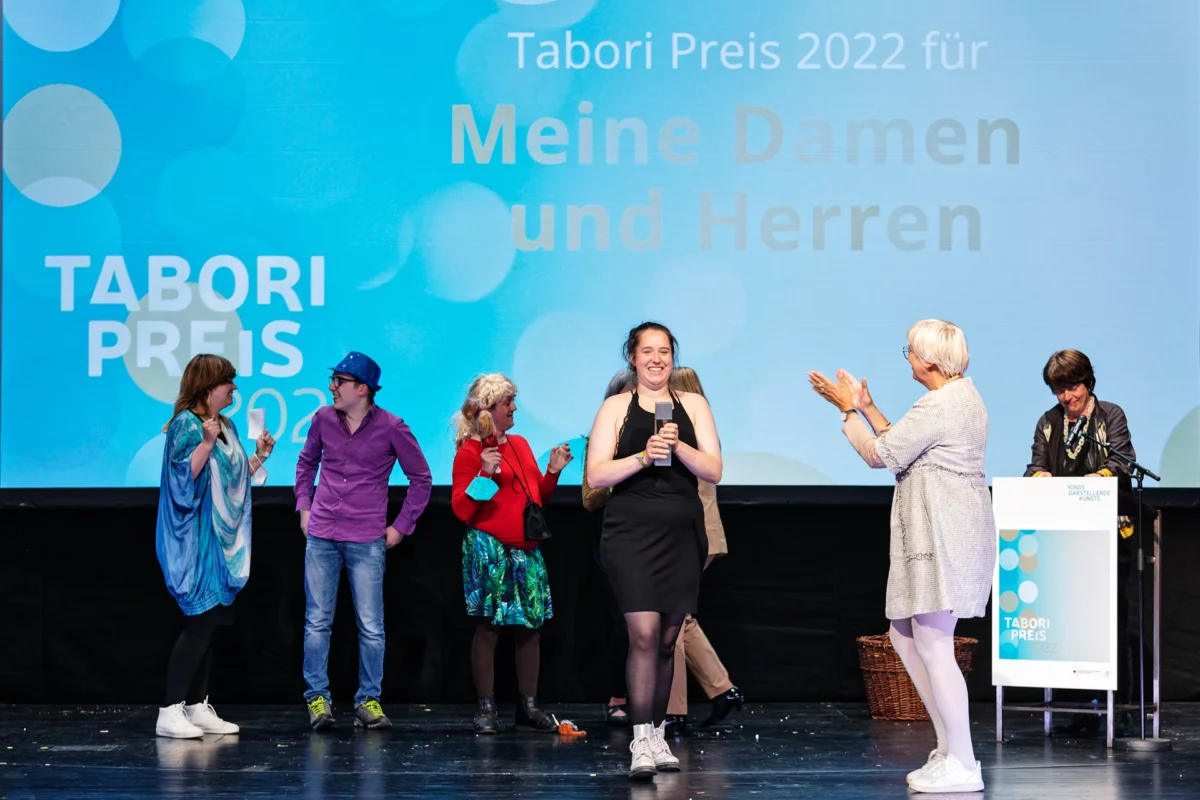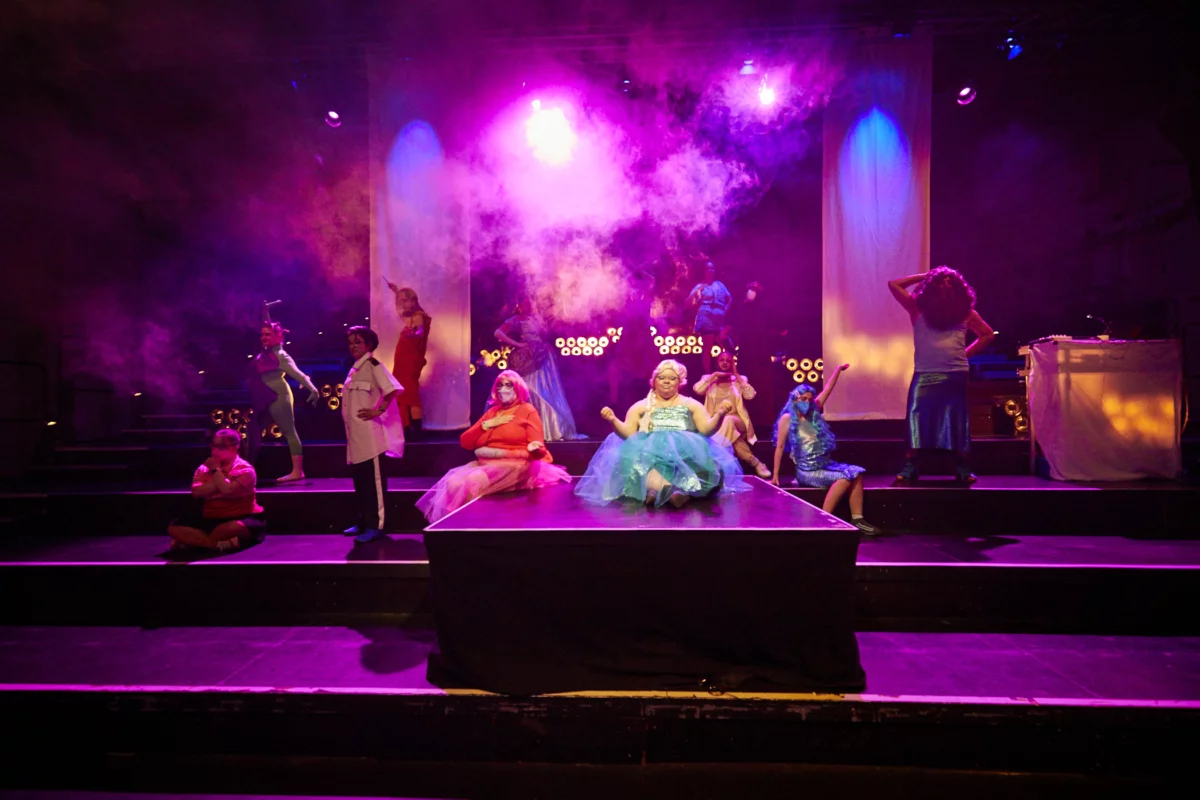"Basically, the entire field is being reordered once again."
By Christine Wahl
Cultural journalist Christine Wahl talks to the Tabori Prize 2022 winners Meine Damen und Herren and jury member Carena Schlewitt about the significance of the Tabori Prize for the award-winning artists and companies and about structural and aesthetic trends in the independent performing arts.
This interview is about the significance of the Tabori Prize. And since no one can assess this as realistically as previous winners, I am delighted to speak with you both, Melanie Lux and Martina Vermaaten, as well as jury member Carena Schlewitt. You represent – as performer and director, respectively – the inclusive theater company Meine Damen und Herren, founded in 1995, one of the very first in the country, which received the Tabori Prize last year. And the first question goes straight to you: The prize is the highest accolade for the independent performing arts in Germany – it is endowed with 25,000 euros. What did you do with the prize money?
Melanie Lux: We had a Tabori Prize party at our Meine Damen und Herren offices in Hamburg. We had everything lovingly decorated and prepared. The party was a complete success; an incredible number of guests came!
What significance did the award have for you?
Lux: The award was really great news for us, we were so delighted because it was a truly wonderful recognition of our work. A lot more people wanted to come to the award ceremony in Berlin than we could bring with us.
Because there are more than 20 of you altogether.
Lux: Exactly. That's why we decided to have another Tabori Prize celebration here in Hamburg.
Martina Vermaaten: I can perhaps add that part of the prize money will go into our next production and thus help finance our further work. And, of course, that I was also very happy about the award. In the past, when artists who were friends of ours received the award, we were always totally thrilled for them. And when we sometimes went to one of the award parties, I secretly thought: It would be nice to receive the award myself someday! So, when I actually opened the letter last year – without my glasses on, of course – I couldn't believe it: What? What does it say? (Laughs) Of course, I thought it was an important political signal, among many other things.
 © Gianmarco Bresadola
© Gianmarco Bresadola
Tabori Prize winners 2022: Meine Damen und Herren
Carena Schlewitt, you have been associated with the Tabori Prize for many years as a member of the jury and, by virtue of your profession, have an excellent knowledge of the independent theater scene. You have worked as a curator at the HAU in Berlin, among other places, later you went to the Kaserne Basel as artistic director and are currently head of HELLERAU – European Center for the Arts in Dresden. What is the relevance of the Tabori Prize, in your view?
Carena Schlewitt: I was a member of the jury once before in 2010 and was therefore present at the very first jury meeting for the Tabori Prize when we selected norton.commander.productions and Gintersdorfer/Klaßen. The establishment of this award was really something very special. In the 1990s, there was a renewal of the independent performing arts, and a lot was happening, also in the East – for example, Theaterhaus Weimar and norton.commander.productions from Dresden, among many others. There was the Impulse Festival and, of course, the Fonds, and suddenly something new came along: a prize that is also associated with such a name. I don't really know how it came about that the award is called the “Tabori Prize”. But when I think about all the places George Tabori went in his life, the artists he worked with and the realities of their lives, how much he travelled internationally and how unpretentious he was, I always think it's a really great name for this theater prize, particularly for this scene, which is always changing and reinventing itself.
How does the selection procedure actually work? Nominations for both the Tabori Prize and the Tabori Award are open to all artists and groups who have received support from the Fonds within the last five years. How exactly does the jury arrive at its decisions, based on this enormous range?
Schlewitt: We are five jury members, and each of us can make two proposals for both the Tabori Prize and the Tabori Award. In the run-up to the meeting, we receive relevant material on all the nominated artists and groups, i.e., descriptions of their work, links, biographies, etc. When we then meet, each person presents their own proposals, gives detailed reasons for them and then the discussion begins. It is difficult for me to describe exactly how the award winners emerge in the end. Because the proposals of others always bring groups and works to your attention that you perhaps didn't know yourself, it's an extremely inspiring process, and there's basically a great appreciation for the different proposals. But what I can say in any case is that an important criterion, especially for the Tabori Prize, is that the group or artist in question has already existed for several years and is working at a high artistic level – whereas with the Tabori Award we look more concretely at what innovative forms we encounter and what themes are new and possibly surprising, so that they actually broaden the scene in this sense. Ultimately, you can say that the different awards meet actors or groups at different points in their artistic process.
Melanie Lux and Martina Vermaaten, you've already talked about the symbolic value and the financial support associated with the prize. Did the award also have a concrete impact beyond that, for example did it change anything about your work?
Vermaaten: Perhaps the most important aspect is that it has given us fresh courage to continue asking questions. In the last seven years, we have tried to collectivize ourselves, to make ourselves more “equal” in our work and, for example, to make sure that the performers also want to work in the organizational structure, to have a say in the program, to get an idea of what dramaturgy means and so on. That was a great way to go, but now we still want to question it again. We're going to have workshops to figure out things like: How do we want to continue working? Are we really a collective? Can we be one – and do all of us even want to be one? Also, the naming is under discussion: “disabled and so-called non-disabled artists.” That's a tricky question that we're still trying to answer.
Lux: I think the prize has also made us more visible. The demand has increased, many more people want to work with us.
Schlewitt: People have been beating a path to your door since the award?
Lux: Yes, we even got a film offer.
Schlewitt: A prize like this can certainly send a signal. I think all the artists or groups who have received the money have first used it for a big party, but also always for an artistic project or perhaps a website or an archive. That's all good and important, and it's also always about drawing attention, both by honoring an artistic achievement and at the same time sending the signal: Hey, look at how this group has been working, for years – and what that means. But what the award definitely can't do is ensure continuity – and that's ultimately what it's all about. All of us together – the production houses, the independent scene, other colleagues who are also active in this scene – must work to ensure that the special nature of this type of production is not only seen, but also supported with the appropriate funding, from the Fonds, but also the states and municipalities.
 © Christian Martin
© Christian Martin
How do you perceive the independent scene as a whole based on your jury work, Carena Schlewitt? What developments and trends are you noticing right now?
Schlewitt: First of all, unfortunately I don't feel like I see enough. The field has grown enormously; I see what I can manage. What I notice structurally is that younger groups don't come together as a fixed collective or as a fixed group in the way that groups from older generations do, but rather switch more between worlds and also between groups. I find that quite interesting; it's such a different form of agility. And at the same time, I admire the groups that were founded between the 1990s and 2000s and have always continued this collective or have led a company for decades, who have really gone through thick and thin together.
These observations refer, as you said, to the structural level. What does it look like in terms of content and aesthetics?
Schlewitt: In both respects, the range has become very wide. I have the impression that basically the entire social, societal, political, but also the artistic field is being reordered once again. Digitalization, sustainability, inclusion – these are all huge issues that artists and groups are working on in all kinds of ways, from puppet theater to dance and performance to action in public spaces. Sometimes I almost have the feeling that the responsibility toward society weighs so heavily that the artistic language or the artistic project sometimes takes a back seat to the attitude, to the position that one first wants to formulate for oneself. Of course, the question of new developments cannot be answered so sweepingly. But it is at least a tendency that I have noticed.
Understandably, all of you, each from your own perspective, have very much appreciated the Tabori Prize during our conversation, praised it and highlighted its importance for your own work. Let's conclude with a thought experiment, because dreams are always possible: If you could design the award yourself, would there be anything you would like to modify or add to it?
Lux: We would have liked it if the award ceremony had been held at our place in Hamburg, then all of us could have attended.
Vermaaten: What we actually need most urgently is support for our public relations work. In this respect, I could imagine that something like this could be connected with the prize – that you ask: What do you actually need most? And that the prize winner is then helped with exactly that. I think that all the groups would actually answer this very differently. I would really like to see this kind of appreciation.
Schlewitt: Of course, the Tabori Prize, the Tabori Award and the International Tabori Award already cover a lot of ground. But there are also teams or collectives that work internationally and place a lot of value on equal positions for both groups, that is, the one that is in Germany and the one that works in another country, under more difficult conditions. And I wonder whether there might not be a form for this as well: to support this kind of equal collaboration with a prize.